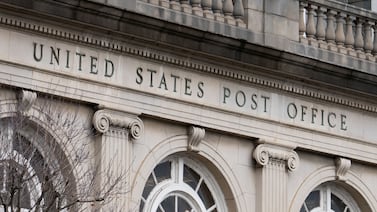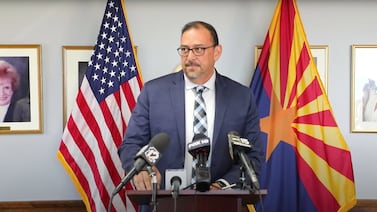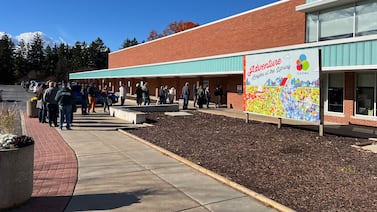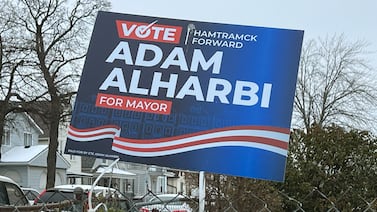Votebeat is a nonprofit news organization reporting on voting access and election administration across the U.S. Sign up for Votebeat Arizona’s free newsletter here.
Four days after the election, with several congressional and state contests yet to be called, Arizona Senate President Warren Petersen declared that it had “taken too much time” to count ballots.
So Petersen made a promise to voters: He would reintroduce bills in the upcoming legislative session “to get election results, night of.”
It was perfectly normal to not yet have final results at that point. In fact, it has sometimes taken as long as two weeks to finish counting ballots in the state, a timeline similar to that of other states that are friendly to voting by mail, such as California and Utah.
But as national attention on Arizona, a swing state where contests can be close, has ramped up, pressure has mounted to count faster. And as unexpected delays sprang up across the state this year, including in rural counties that typically count quickly, the longer timeline fueled consternation among candidates and voters waiting for final results.
Petersen, a Republican, is one of many officials who have said they want faster results next time around. Secretary of State Adrian Fontes, a Democrat, along with other state lawmakers and nearly all Maricopa County supervisors, have also said this is a priority.
So far, solutions leaders have proposed have taken aim at just one part of the system: a state law allowing voters to drop off their early ballots at polling places on election day. Hundreds of thousands of Arizona voters do this, and it’s a major reason why counting extends so far past election day.
But it’s not the only reason, and changing that law is not the only possible solution. It also may not be politically feasible. Gov. Katie Hobbs, a Democrat, has said she would kill any bills that would limit voting access, including any limiting early ballot drop-offs.
Other potential responses include shortening the ballot, buying new types of machines, and adding staff. Some of those options could increase costs for county governments.
Here’s a rundown of some of the changes that could speed up Arizona election results:
Change early ballot drop-off laws
The focus of the main proposals circulating right now involve limiting when, where, or how voters can cast the ballots sent to them in the mail. These are generally referred to as “early ballots” in Arizona. The state was an early adopter of mail voting and early voting options.
Early voting begins around a month before election day, but a good percentage of voters wait until then to return their ballots. In Maricopa County this presidential election, around 1 in 10 voters, or 225,000 people, dropped off their ballot on Election Day.
These last-minute ballot drop-offs take time to process and count. The voter signature must be verified, and voters with mismatched signatures are given five days to verify their identity. The ballots then need to be removed from the envelopes, inspected, and prepared for counting.
Maricopa County Supervisor Thomas Galvin, a Republican, is among those supporting a change to state law to prohibit voters from dropping off early ballots at polling locations on election day. This would mean counties have fewer ballots to process on election day, so they can more easily post the results on the night of the election.
As part of the proposal, Galvin wants a new state law to require government buildings to function as polling sites, if needed. If early ballot drop-offs are banned on Election Day, he said, more polling sites — such as schools — would in fact be needed to deal with the corresponding increase in voting on that day.
Another option: prohibiting voters from dropping off ballots at polling locations on election day, but allowing them to drop them off at one central location. That’s what Florida does, and that’s a big reason why the state is able to post the majority of results on election night.
Petersen said he and others recently spoke with Florida Secretary of State Cord Byrd, and will introduce a bill following that state’s model of only allowing early ballots to be dropped off at the county recorder’s office on election day.
His bill will also eliminate the requirement to verify the signatures of voters casting an early ballot in person during early voting, because these voters already show identification.
Another bill has already been filed by GOP Sen. J.D. Mesnard, for the legislative session that begins in January. Mesnard’s bill would require any voter who drops off their mail ballot at a polling location on election day to show identification.
That would cut back on the post-election processing time considerably, without banning drop offs entirely or restricting them to a single location.
Some voting rights groups believe that requiring ID at the polls is burdensome for voters who might not have it readily available. But Mesnard said he believes most people support voter ID laws, and he sees this as a reasonable trade-off for faster results.
Make a shorter ballot
The ballot in eight of Arizona’s 15 counties was so long this November that some contests spilled onto a second sheet of paper. The two-page ballot meant double the paper for counties to process, which caused most of the counting delays across the state.
The main reason the ballot was so long is because state lawmakers referred 11 propositions to the ballot, which took up a lot of space. This was a way for the Republicans, who controlled the Legislature, to bypass Gov. Katie Hobbs, a Democrat, and get their ideas in front of voters without fighting through a gubernatorial veto.
Alex Gulotta, Arizona director for the voting rights group All Voting is Local, called the legislative referrals “excessive.”
“We could, in fact, pass a law limiting the number of legislative referrals specifically to protect our election administration,” he said. “That would be a wise thing to do.”
So far, no lawmakers have proposed such a restriction.
Buy new machines to count votes faster
Using machines instead of humans to perform time-consuming tasks could also speed up the process.
In Maricopa County, that would mean buying envelope openers, for example. And other counties could switch to using computers to help review and decide voter intent when voters leave questionable marks.
Some other large counties in the U.S. with a lot of vote-by-mail ballots use machines to open ballots.
For example, Orange County, California — which in November processed about 1.1 million mail ballots compared with 1.8 million in Maricopa County — owns equipment to straighten the envelopes to prepare them for opening; these are also known as “jogging” machines. And it owns 16 mail extraction devices to open the envelopes and extract the ballots.
Incoming county supervisors have indicated a willingness to spend to speed up results. The extractors cost about $42,000 each, with a $1,250 annual maintenance charge, according to Bob Page, Orange County’s registrar of voters.
Without them, Page said, “sorting and examining ballots by hand would be a much slower process.”
While Maricopa County uses a computer program to help teams of workers quickly decide voter intent, a process called “electronic adjudication,” most other counties instead have workers duplicate the voter choices clearly onto a new ballot. That slowed down the process considerably this year.
That was the main reason why it took Pinal County 24 hours to count ballots cast on Election Day, for example.
Cochise County, at least, is considering switching to using electronic adjudication in the future, according to Joe Casey, associate county administrator overseeing elections.
Add staff to process ballots faster
Hiring and training more people to handle ballots would shorten the counting period by days in some counties.
Small counties, in particular, struggled to process the two-page ballot with their small staff. It took longer than anticipated just to open the envelopes and inspect the two pages, and to decide voter intent where it was unclear.
Yuma County, for example, was the last to finish, just barely meeting its Nov. 21 deadline set by state law to certify results. County supervisors during the public meeting to certify results said that they wanted to ensure, in future elections, the elections staff had what they needed to do the job more quickly.
County Recorder Richard Colwell told them that he had asked them to hire more staff members prior to the election, but they declined to increase his budget.
Colwell said in an interview that the county only has five staff members in voter registration and three in elections to count all 69,000 ballots cast, and he had unsuccessfully asked for two more staff members. His staff worked 80 to 100 hours the week of the election, he said.
“I told you we were going to get slammed,” he told supervisors during the meeting.
Jen Fifield is a reporter for Votebeat based in Arizona. Contact Jen at jfifield@votebeat.org.





